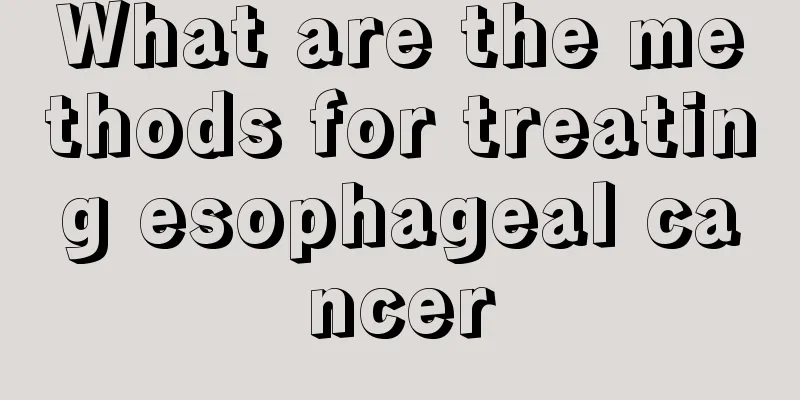What are the methods for treating esophageal cancer

|
Esophageal cancer is a common digestive tract tumor, with about 300,000 people dying of esophageal cancer each year worldwide. Its incidence and mortality rates vary greatly from country to country. my country is one of the areas with a high incidence of esophageal cancer in the world, with an average of about 150,000 deaths each year. There are more males than females, and the age of onset is mostly over 40 years old. The typical symptom of esophageal cancer is progressive dysphagia, first it is difficult to swallow dry food, then semi-liquid food, and finally water and saliva cannot be swallowed. Treatment of esophageal cancer includes surgical treatment, radiotherapy, chemotherapy and comprehensive treatment. The use of two or more treatments simultaneously or successively is called comprehensive treatment. Results show that comprehensive treatment has better effects. 1. Surgical treatment Surgery is the first choice for treating esophageal cancer. If the patient is in good general condition, has good cardiopulmonary reserve, and has no obvious signs of distant metastasis, surgical treatment can be considered. Generally, the chances of resection are greater if the length of cervical cancer is less than 3 cm, the length of upper thoracic cancer is less than 4 cm, and the length of lower thoracic cancer is less than 5 cm. However, there are also cases where the tumor is not too large but is tightly adhered to major organs such as the aorta and trachea and cannot be removed. For larger squamous cell carcinomas that are estimated to be unlikely to be resected but the patient is in good general condition, preoperative radiotherapy can be used first, and surgery can be performed after the tumor is reduced. 2. Radiation therapy ①Combined treatment of radiation and surgery can increase the surgical resection rate and improve the long-term survival rate. After preoperative radiotherapy, it is more appropriate to rest for 3 to 4 weeks before surgery. Metal marking is made on the residual cancerous tissue that was not completely removed during surgery, and postoperative radiotherapy is generally started 3 to 6 weeks after surgery. ②Single radiotherapy is mostly used for cervical and upper thoracic esophageal cancer. The surgery for such patients is often difficult, with many complications and unsatisfactory results. It can also be used for patients with surgical contraindications but the lesion has not been long and the patient can still tolerate radiotherapy. 3. Chemotherapy Combining chemotherapy with surgery or radiotherapy and traditional Chinese medicine can sometimes improve the efficacy or relieve symptoms and prolong the survival of patients with esophageal cancer. However, it is necessary to regularly check blood counts and liver and kidney functions, and pay attention to drug reactions. |
<<: Treatment methods for advanced esophageal cancer
>>: Folk remedies for the treatment of esophageal cancer
Recommend
What are the effects of mothballs?
Mothballs are a very common deodorant in our dail...
Is herpes simplex contagious? It turns out to be like this
Herpes simplex is a common skin disease in daily ...
How long is the survival period of small cell lung cancer
How long is the survival period of small cell lun...
What to do if high heels hit your feet
High heels are every woman's favorite and are...
What fruits are good for patients with advanced kidney cancer?
No matter what disease you are treating, it is ve...
What to do if ovarian cancer is diagnosed during pregnancy
Ovarian cancer is a very scary malignant tumor. T...
Did you know that esophageal cancer can be cured?
Can advanced esophageal cancer be cured? This is ...
What should prostate cancer patients pay attention to after radical prostatectomy?
Prostate cancer patients must pay attention to so...
Will the blisters disappear on their own?
After a burn, the skin will gradually blister, pe...
Liver cancer usually occurs in these 4 types of people. Learn 6 tips to effectively prevent liver cancer
The incidence of liver cancer in my country is on...
What is the difference between brain cancer and brain tumor
The symptoms of many diseases are difficult to di...
How do mites form?
Mites are actually common pests in our daily life...
What should you pay attention to in your diet for nasopharyngeal cancer
There are many things that nasopharyngeal cancer ...
What is the cause of thigh root pain
At present, in daily life, we often find thigh mu...
What are the main types of bladder cancer?
If it is confirmed to be bladder cancer, in addit...









